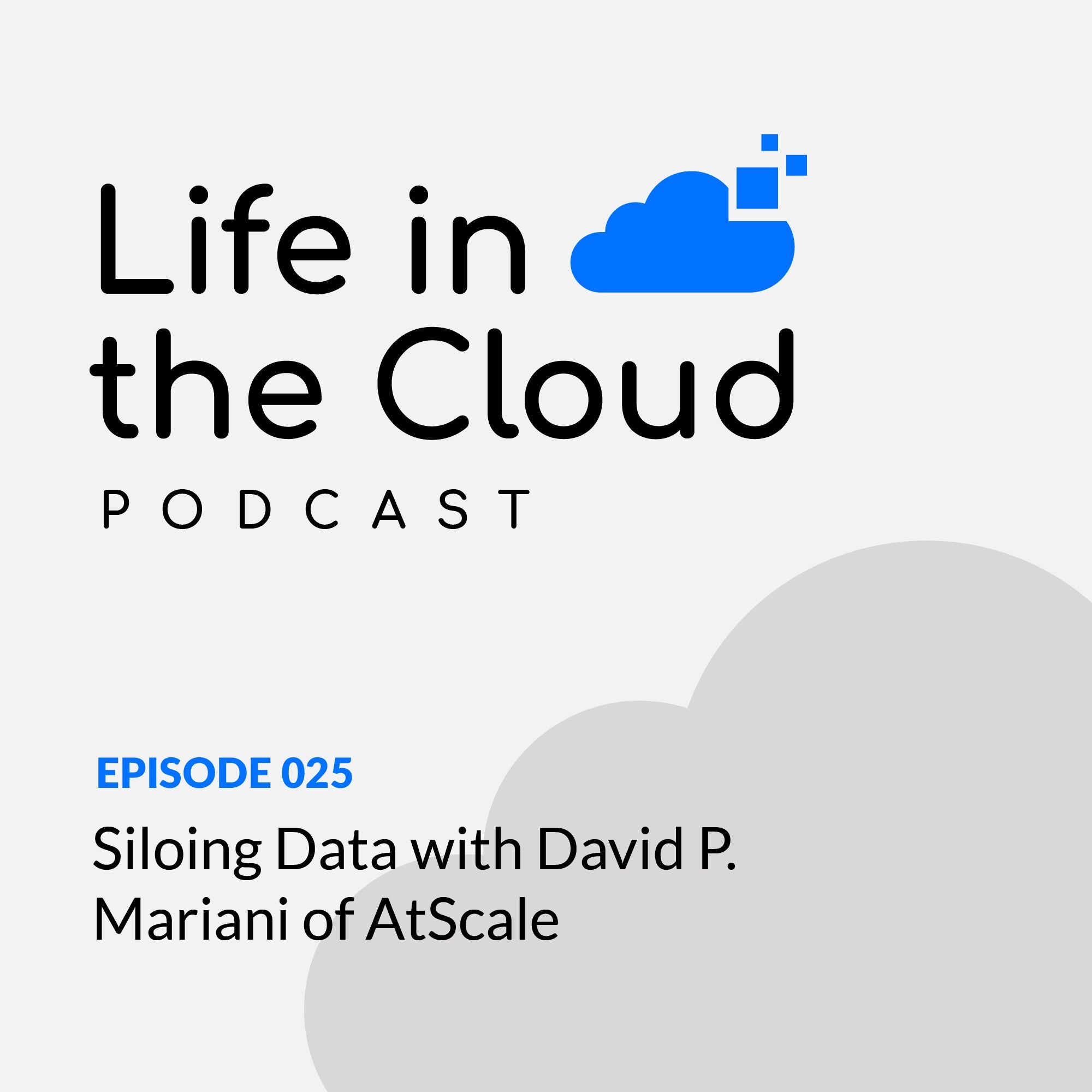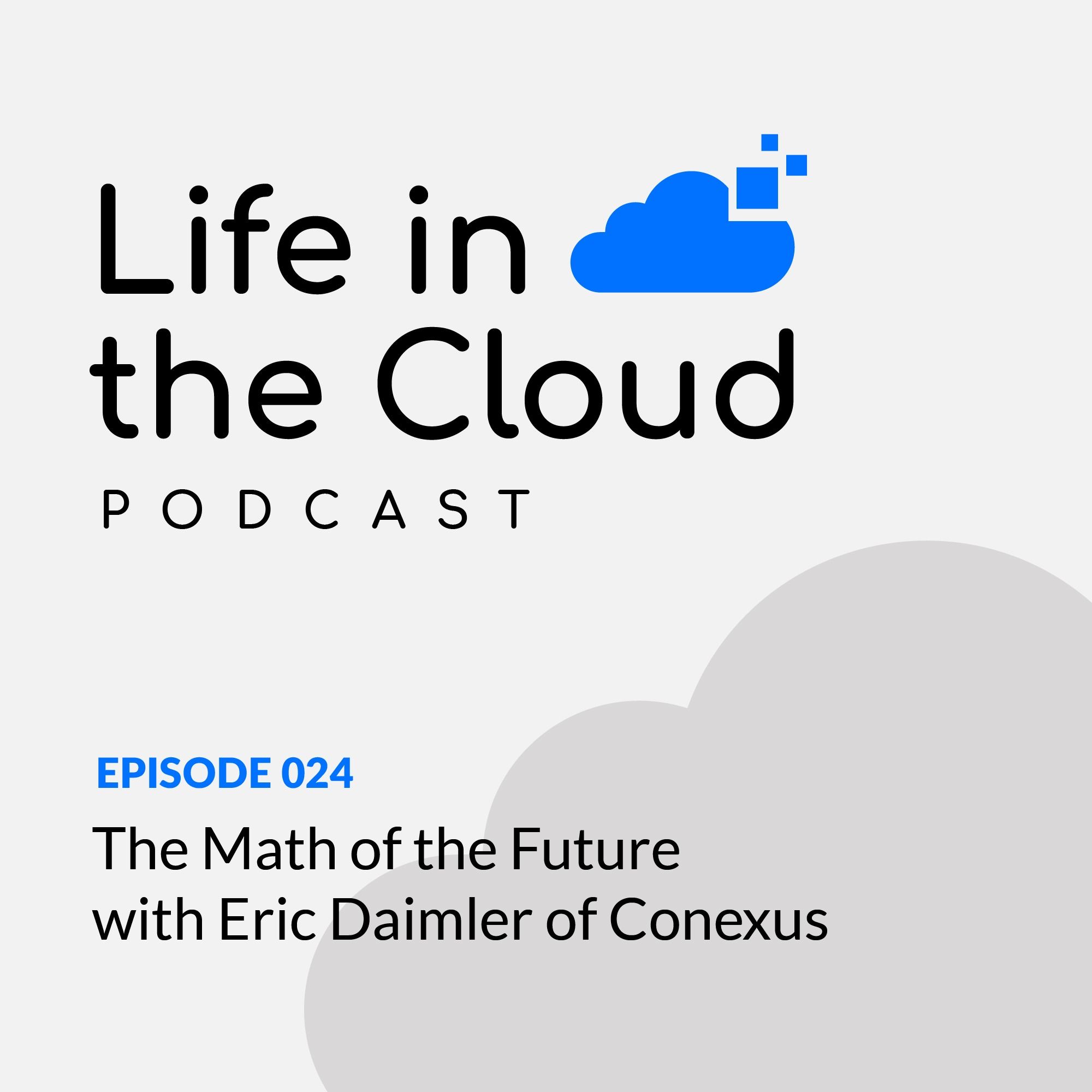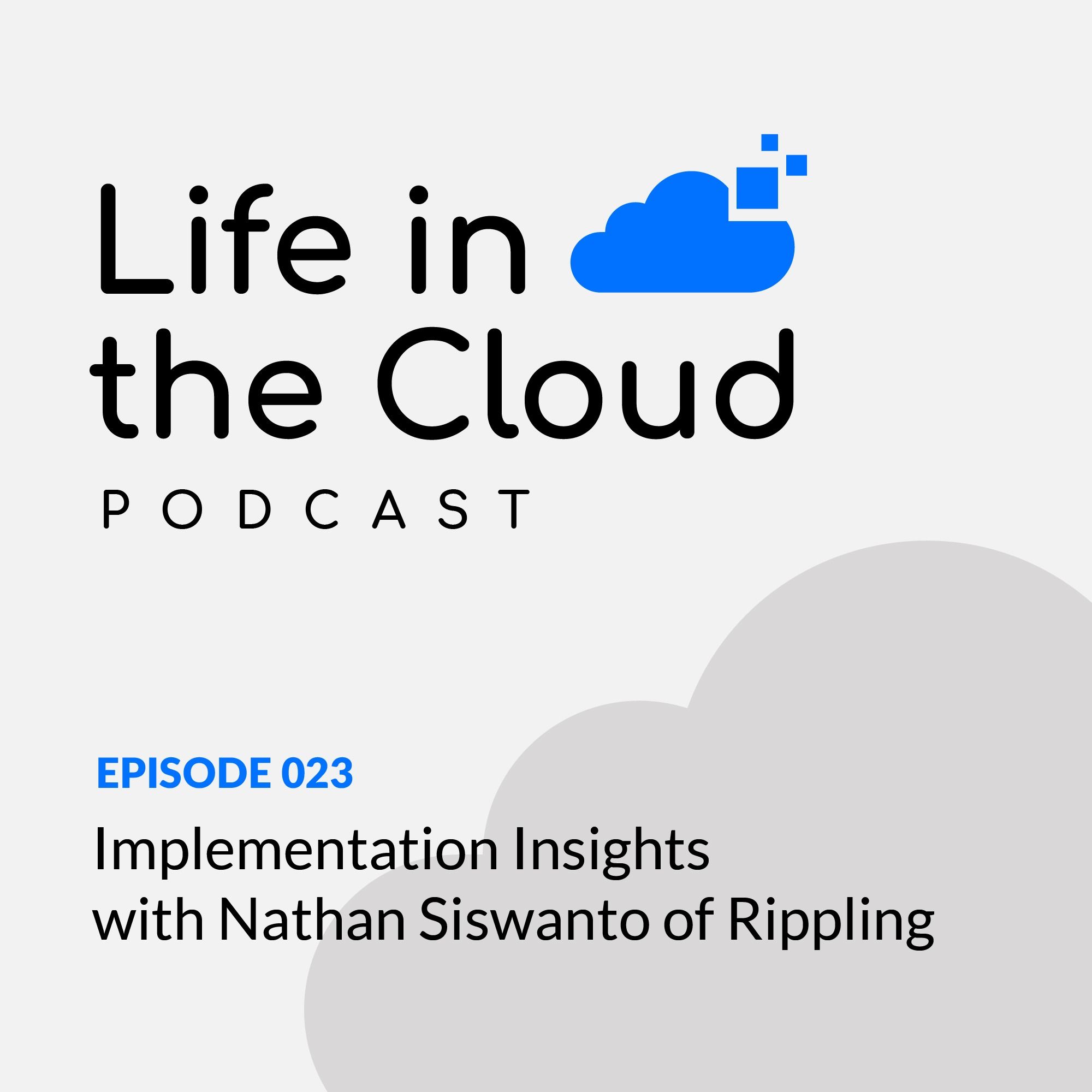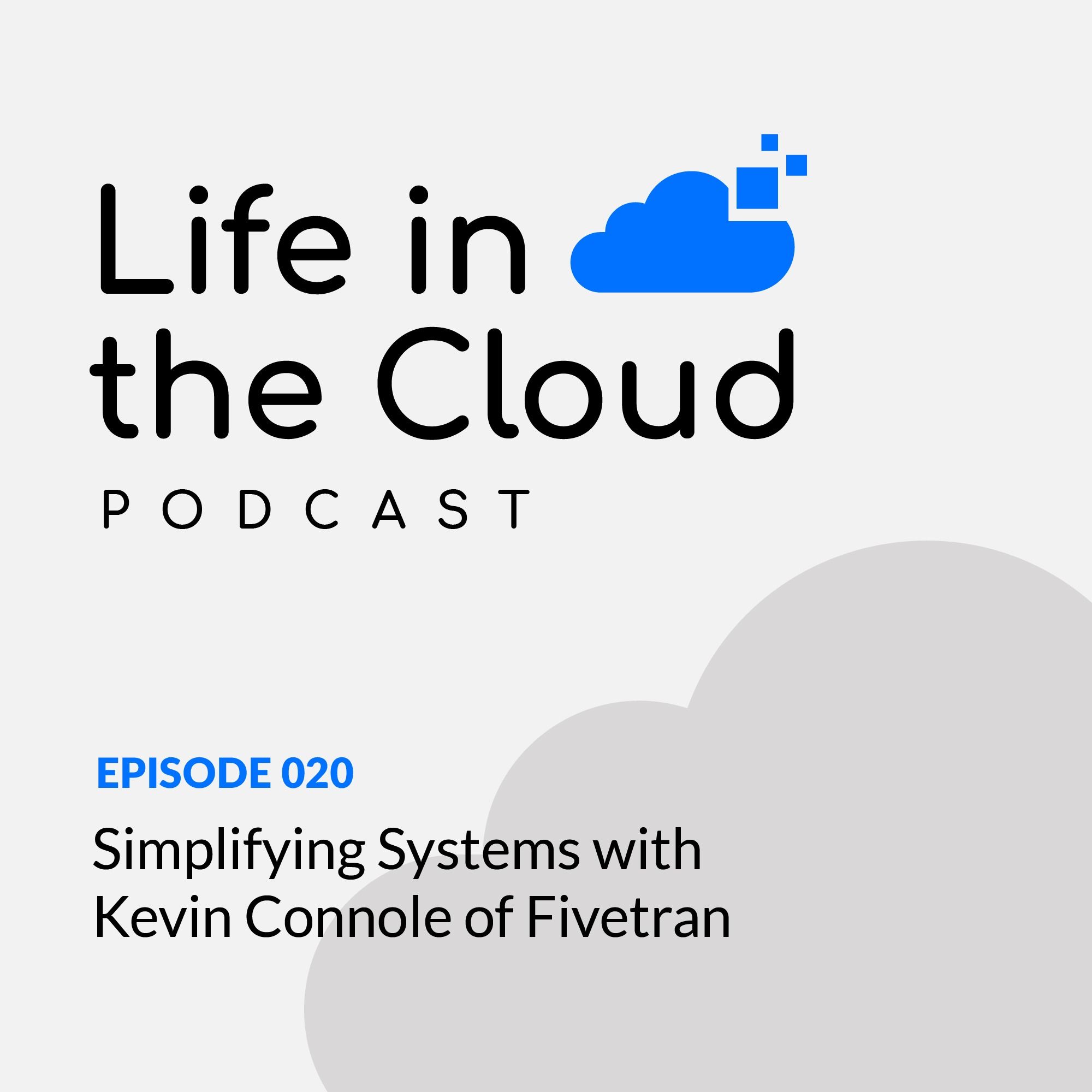Discover Life in the Cloud
Life in the Cloud

40 Episodes
Reverse
Two sisters: one ends up a nurse and the other ends up dead. They were charged with similar offenses, and both wound up in jail. They were placed in different jails across county lines, with a wide disparity in available funding and rehabilitative potential. Joshua Essex is the co-founder and CTO of Recidiviz, a tech nonprofit that aims to lessen incarceration rates and improve outcomes for the American justice system.Joshua shared this story about his cousins and what led him and a small group of friends to start Recidiviz."I want to alleviate as much human suffering as quickly as I can."Joshua dives into the complexities of gathering and interpreting criminal justice data. During COVID, data played an integral role in saving lives. Recidiviz built an epidemiological model tailored to prisons and jails that was used by government agencies during their COVID response.For anyone with a technical skill set, Joshua encourages you to consider what problems you're most passionate about. If there's something you care about, there's an organization working to solve that problem that needs your help.Don't forget to subscribe to the show on iTunes, Spotify, or wherever you get your podcasts.See you in the next episode!
https://www.theyes.com/"There are many opportunities for new companies to offer a fresh voice to reset people's expectations on what's possible for fashion companies and retail."Greg Sakorafis is the head of shopping experience engineering at THE YES. With its AI machine learning model, THE YES aims to bring more enjoyment and ease back into retail.“It used to be called retail therapy, and I feel like a lot of the time it’s retail anxiety.” Greg gives his take on how the shopping experience has changed in the last several years.With technology, we have more awareness of the impact on people’s mental well-being. Greg emphasizes the need for careful application and consideration of the emotions involved in the retail and fashion industry. At the core, businesses should be serving people to make their lives better. To have an overall positive effect for people and then repeat it within the company. THE YES is currently hiring for several positions. Learn more on their careers page.Don't forget to subscribe to the show on iTunes, Spotify, or wherever you get your podcasts.See you in the next episode!
The practical applications of IoT are much more extensive than you might be aware of. Just a few examples of its use are in baseball analytics, the monitoring of oil rigs, and dynamic routing systems that track thousands of palletized shipments.Ian Uriarte, founder and CEO at Timbergrove, joins Kris Reddy on this episode of Life in the Cloud. Timbergrove aims to predict when an unforeseen event will occur. That way, action can be taken before disaster strikes. Think of a submersible oil rig in the ocean. If there's a problem, they have to shut off operations for one day. The opportunity cost is millions of dollars in one day.Timbergrove has also used its solutions for tracking pitching optimization in baseball. It built a mobile and web application. The app's dashboard gave analytics like the baseball's incision angle, speed, and the quadrant of the strike zone a throw would go through.Timbergrove is currently hiring a senior front-end developer who is familiar with UX and UI. Learn more here and listen to the episode to hear more from Ian on IoT applications. Don't forget to subscribe to the show on iTunes, Spotify, or wherever you get your podcasts.See you in the next episode!
Family-owned technology company CherryRoad Technologies has almost 40 years of industry experience. It has successfully navigated and aided in the migration of companies to the cloud.Mastering communications with a business-centric focus has been instrumental in its continued success.Nazgol Khamneipur joins host Kris Reddy on this episode of Life in the Cloud. At the time of the interview, Nazgol was program manager of Oracle Cloud at CherryRoad Technologies. Now she is the director of Oracle Cloud. Nazgol provides insight into what makes CherryRoad’s implementations execute optimally. A clear understanding and translation of what are the pain points are vital. "The best way to learn: make mistakes and see what happens when you make mistakes and figure out how to fix it." Nazgol shares her enthusiasm for more women entering the tech space, which has always been a predominantly male industry. Within CherryRoad, many women are taking on leadership, project management, and executive roles. Listen in to hear more fascinating tidbits and questions to ask for a smooth implementation process. Don't forget to subscribe to the show on iTunes, Spotify, or wherever you get your podcasts.See you in the next episode!
CrowdStrike created a new category of cybersecurity. Its cloud-native endpoint protection platform, the first of its kind, was the next-gen antivirus.Director of global alliances at CrowdStrike, Vivek Kumar, joins host Kris Reddy on this episode. Now a household name in cybersecurity, Vivek shares the inception point and the many innovations CrowdStrike has made.A sensor called Falcon can scale with the addition of 10s or 100s of new servers. Falcon can work on a personal laptop to EC2 Instance. Cloud-native and cloud-delivered, there's no need to restart anything as the network scales up. Vivek manages CrowdStrike's partnership with AWS, noting that they complement each other's business. CrowdStrike also works with and can be applied to on-prem networks to any cloud provider.Vivek’s career has spanned programming to sales and marketing, and he provides insights into the learning he has gained."We don't realize lots of experiences in our lives, how they will come to play to help even more. You will not know unless you get into those types of situations." Don't forget to subscribe to the show on iTunes, Spotify, or wherever you get your podcasts.See you in the next episode!
Iterations upon iterations, fine-tuning a product for perfection. In the ever-evolving industry of insurance software, perfection never comes. There are always new customer requests and innovative features to be released, as VP of Product Management at Guidewire Software, Gal Josefsberg points out.In this episode of Life in the Cloud, host Kris Reddy and Gal cover everything from employee enablement to customer-centricity.Gal gives adoption as the key metric in releasing new features for their customer base. Are people using it? If not, why not? With any new feature or add-on, consider how many customers want it and will actually use it.Gal goes on to speak on Guidewire's successes and challenges in migrating to the cloud. Guidewire built up its legacy software on-premise, over 20 years in the making. Insurance carriers are experimenting with new arrays of coverage—everything from pet insurance to cyber risk insurance. This requires Guidewire to be nimble with its offerings.Guidewire is hiring, and Gal encourages those interested to do their research. He stands by Guidewire being an incredible place to work. Check out their openings here.Don't forget to subscribe to the show on iTunes, Spotify, or wherever you get your podcasts.See you in the next episode!
The universal and revolutionary shift in technology to AI is evident, but what's next? What's the next ‘cloud' in tech?CIO of Gainsight, Karl Mosgofian joins host Kris Reddy on this episode of Life in the Cloud. Over 30 years in tech as a programmer and business analyst, Karl is aware of the changing trends in the industry. He foresees more involvement with less technical things, giving users a more straightforward approach to using their applications at maximum performance.Karl and Kris also hash out specifics of the CIO role and discuss how the dynamics of cybersecurity have changed in the last three decades. At startups, Karl predicts one of the earliest hires will be responsible for customer success. This role will be pivotal in retaining customers. The model is working for Gainsight as they're hiring like crazy and seeing astounding growth in their company. Check out their careers page to learn more. Don't forget to subscribe to the show on iTunes, Spotify, or wherever you get your podcasts.See you in the next episode!
What is blockchain, and how can it be applied to business?Host Kris Reddy interviews Cory Hymel at Gigster. Formerly the Senior Solutions Architect, Cory recently shifted to Gigster's Head of Blockchain. Cory simplifies blockchain into digestible bites. At its core, it's a distributed ledger.You visit your bank's website to see your balance and inherently trust them to be correct. Now imagine the vast amount of transfers coming in and out of the thousands of accounts at each bank. Again, we trust them to be accurate. The difference with blockchain is that ownership of ledgers is in the hands of all the bank's users. It's a democratization of ledger data. Now imagine this concept applied to hospitals, healthcare, and patient records across the country.We also dive into cryptocurrency mining, NFTs, and more in this episode. If you're an expert in the blockchain and all things cryptocurrency, Cory wants to hear from you! Don't forget to subscribe to the show on iTunes, Spotify, or wherever you get your podcasts.See you in the next episode!
Groupsite.com is a community-building platform that optimizes asynchronous communications. In this episode of Life in the Cloud, host Kris Reddy interviews their CTO, Kamal Hood.With an extensive tech background, Kamal was taking programming classes in high school. This was before the internet was fully deployed. For over a decade while freelancing, he developed custom databases, CRMs and helped companies shift over to the cloud."When you move to the cloud, it frees you from having to maintain hardware that isn't your core business."Kamal has a way of breaking down complex tech topics into understandable bits. From the start, he explains, solid performance logging and monitoring will help smooth out cloud operations. He shares how he helped reduce costs with their operation, simplifying systems to their minimum required usage. For instance, they were running five app servers with four workers. Now only using two servers and two employees, they're still able to provide live updates, even with their thousands of users on their platform at any time. Listen now to learn more from Kamal.Don't forget to subscribe to the show on iTunes, Spotify, or wherever you get your podcasts.See you in the next episode!
How do you provide data feedback near instantaneously on a massive scale?Mark Van de Wiel, CTO at HVR, joins me for another episode of Life in the Cloud. HVR is in the data replication space. It serves large enterprise customers like Pitney Bowes, Lufthansa Airlines, and the U.S. Coast Guard.Fifteen years ago, the most extensive data warehouses used maybe ten terabytes total. Nowadays, HVR is handling ten terabytes of data changes in a single day. Instrumental to their continued successes, Mark alludes to HVR having been scalable and highly efficient."What can we do to help our customers be successful in adopting some of these technologies and essentially solve their data problems?" Mark shares insights into how HVR anticipates changes in the industry to meet their customers' needs best.Mark teaches about the least intrusive approach to capturing changes out of a transactional database system. It's through an innovation called Change Data Capture, and blockchain plays a role. Listen to this episode to learn more.Don’t forget to subscribe to the show on iTunes, Spotify, or wherever you get your podcasts.See you in the next episode!
Our guest this week has a Ph.D. in Mathematics. Chris White was the first hire and is now CTO of the rapidly growing company, Prefect.Prefect is an open-source workflow management system. Through its cloud API, it allows its users to own their execution environment. Chris shares many exciting insights into the beginnings of a startup. The earlier the stage of a startup, the more landscape you have to define your position. "I like taking bets on myself, and going to a startup is the fundamental bet that I can do something here and turn this into a valuable, interesting tool for developers to use." Check out Prefect’s careers page to learn more about open positions. If you excel at and enjoy math but are unsure of its practicality, you'll want to give this episode a listen. Chris relates several usage cases of math to software and programming. Don’t forget to subscribe to the show on iTunes, Spotify, or wherever you get your podcasts. See you in the next episode!
The cloud vs. on-prem. Is one more secure than the other? What security concerns arise when moving to the cloud?On this episode of Life in the Cloud, Eyal Arazi, Product Marketing Manager at Radware joins the show. Eyal points out that on-prem environments are typically self-contained. Cloud environments rely on shared API, shared identities, and shared roles.If there were an attack on a web server with on-prem, that's as far as the attack would go. In the cloud, the attackers could piggyback off the web server to access the database that sits behind it. "Think of it like skipping stones in a pond. You're not interested in that first hop, but you're interested in the subsequent hops."Eyal reminds us that on-prem security has been around for 40 years while cloud security is still in its infancy. It doesn't make it less secure than on-prem.Hear about the key issues to consider to securely move to a cloud environment and much more in this episode. Don't forget to subscribe to the show on iTunes, Spotify, or wherever you get your podcasts.See you in the next episode!
Website protection—has the book switched from nice-to-have to must-have?It is a need if you're running an e-commerce site or handling customer data of any sort. The increase of 'bad bots' in the last couple of years is hard to fathom.On this episode of Life in the Cloud, I interview Benjamin Fabre. He's the CTO and Co-Founder of DataDome, a company that safeguards websites against nefarious bots.Benjamin points out, “Any website is exposed on the internet because they are using many CDNs. They have many applications. They are running their software inside different cloud providers. The exposure is wider than it was in the past. It's hard to be protected now.”Doubling their revenue over the last three years, DataDome is still growing. Check out their website for a potential career with DataDome.Listen to this episode to hear more from Benjamin. How did they discover the presence of unregulated bot traffic? What is in store for the future of DataDome and this subset of cybersecurity?Don’t forget to subscribe to the show on iTunes, Spotify, or wherever you get your podcasts.See you in the next episode!
Why do people go to the cloud? When should a company not move to the cloud?In this episode, host Kris Reddy interviews the SVP of Strategy at SenecaGlobal, Michael O'Malley. "We're trying to take what they have and move it to a more scalable, more sustainable model in a cloud-based environment."Michael points out the importance of leveraging analytics in their business. They want to help their clients' products be as useful to their customer base as possible.Cases in which the cloud might not make sense involve high risk. Take a finance application with sensitive information that only a few people use.Speaking of risk, Michael also dives into cybersecurity intricacies. Responsibilities shift when moving to the cloud. It's not a matter of it being any more or less safe. Michael sees huge growth areas around cloud-native software development. SenecaGlobal wants to help its customers take advantage of flexibility, agility, and analytics via the cloud. Listen in to this episode to gain more enlightening insights on the cloud from Michael.Don’t forget to subscribe to the show on iTunes, Spotify, or wherever you get your podcasts. See you in the next episode!
What advice would you give to people who are starting up companies?David P. Mariani, CTO and Co-Founder of AtScale, joins us on this episode of Life in the Cloud.By living the problem and walking in your customers' shoes, you’re better able to develop a product.Don’t take David’s advice for granted. He’s been a part of several successful startups in his expansive career. All his jobs built on top of one another to solidify his industry-leading expertise and understanding of data.The importance of adding a semantic layer for interpretation makes all the difference. David sees the industry of data analytics becoming more simplified. By making the machine do more, humans can become smarter.“The key is to bring the data to the user, rather than bringing the user to the data.”What else is in store for the future of data analytics? How are we going to be using data to predict the future?Listen in now to learn more from David. Don’t forget to subscribe to the show on iTunes, Spotify, or wherever you get your podcasts. See you in the next episode!
What is Category Theory, and why is it called the math of the 21st century?We’re fortunate to have the CEO and Co-Founder of Conexus, Eric Daimler, join us for this episode. Eric carries a wide breadth of experience, from Professional Investing to Policy Advisor and Author. He taught at Carnegie Mellon and worked under the Obama Administration.Eric emphatically speaks on the potent potential of Category Theory. When working with billions and even trillions of data points, this branch of math holds the key to faultless data.Eric provides real-world applications where Conexus is using Category Theory, including ride-sharing apps such as Uber, investing applications, and diabetes datasets. When looking at big data, there's a necessity for zero mistake data. With thousands of ambiguities, this becomes impractical.Category theory's relevance and applications are only taking off. Eric recommends his Co-Founder's book to learn more on the subject, which you can check out at the link below.Listen to the episode to learn more now!Don’t forget to subscribe to the show on iTunes, Spotify, or wherever you get your podcasts. See you in the next episode! Resources:https://mitpress.mit.edu/books/category-theory-sciences
Imagine a software system that requires a different implementation process for each customer. Now imagine scaling up at a tremendous pace while maintaining excellent customer satisfaction.From 200 to 500 employees in two years, Rippling provides an evolving HR software system. In this episode Rippling’s Manager of Implementation, Nathan Siswanto, joins the show.How has Rippling cultivated a successful implementation practice?Nathan shares the greatest need for having an open communication process. Then continuously iterating the process.How did Rippling get started, and how have they managed its exponential growth? What's in store for the future of Rippling and the HR software industry? Nathan encourages you to check out the open positions if you're looking to get into tech and be challenged with a growth-oriented role.Listen in to hear further implementation insights and learn more from Nathan.Don’t forget to subscribe to the show on iTunes, Spotify, or wherever you get your podcasts. See you in the next episode!
"How do we make sure that our systems are scaling to support that growth we are going to see in the coming years?"We have the Head of Business Systems at Benchling, Shreenath Panditrao, join the show in this episode.Born at MIT in 2012, Benchling is a company that accelerates research and development. Built via the cloud, Benchling had in mind easing the process of scientific collaboration. Shreenath oversees a suite of products, hundreds of different software packages. They allow Benchling to be flexible in addressing the ever-changing needs of their customers. Shreenath emphasizes the product mindset over a project mindset to sustain growth in the industry. Head over to their website if you'd like to run a free trial or request a live demo to see how Benchling works in action. Don’t forget to subscribe to the show on iTunes, Spotify, or wherever you get your podcasts. See you in the next episode!
What do you think is the most crucial skill for success in the 21st century? With 16 years of experience in IT, cybersecurity, and the Navy, Bob Fabien Zinga carries a tremendous wealth of knowledge. Luckily, we have him as our guest on this episode of Life in the Cloud. Currently Director of Information Security at Directly, Bob shares his wisdom on the changing dynamics of leadership from the 20th to the 21st century. "No matter what you do, no matter what industry or job, you really need to become a leader—an effective leader—in the 21st century to be successful."“Leadership is influence,” Bob says. What cybersecurity issues does the Navy deal with? How do these issues compare with commercial business? Bob provides anecdotal evidence for the necessity of cybersecurity across all of IT. Listen in now to learn more about these topics. Don’t forget to subscribe to the show on iTunes, Spotify, or wherever you get your podcasts. See you in the next episode!
What SaaS do you use for your business that stands out in making a difference? How much time do you or your company spend organizing data?IT Manager of Fivetran, Kevin Connole, joins us in this episode of Life in the Cloud. Fivetran is a SaaS company that automates data integration to simplify data analytics. Kevin highlights several features that add up to tremendous time savers for their company, like single sign-ons, consolidating software packages you currently have, and many more.In particular, there’s one software that Kevin ends up mentioning more than any other. Listen in to learn about the biggest difference-maker for Fivetran.Don’t forget to subscribe to the show on iTunes, Spotify, or wherever you get your podcasts. See you in the next episode!
























